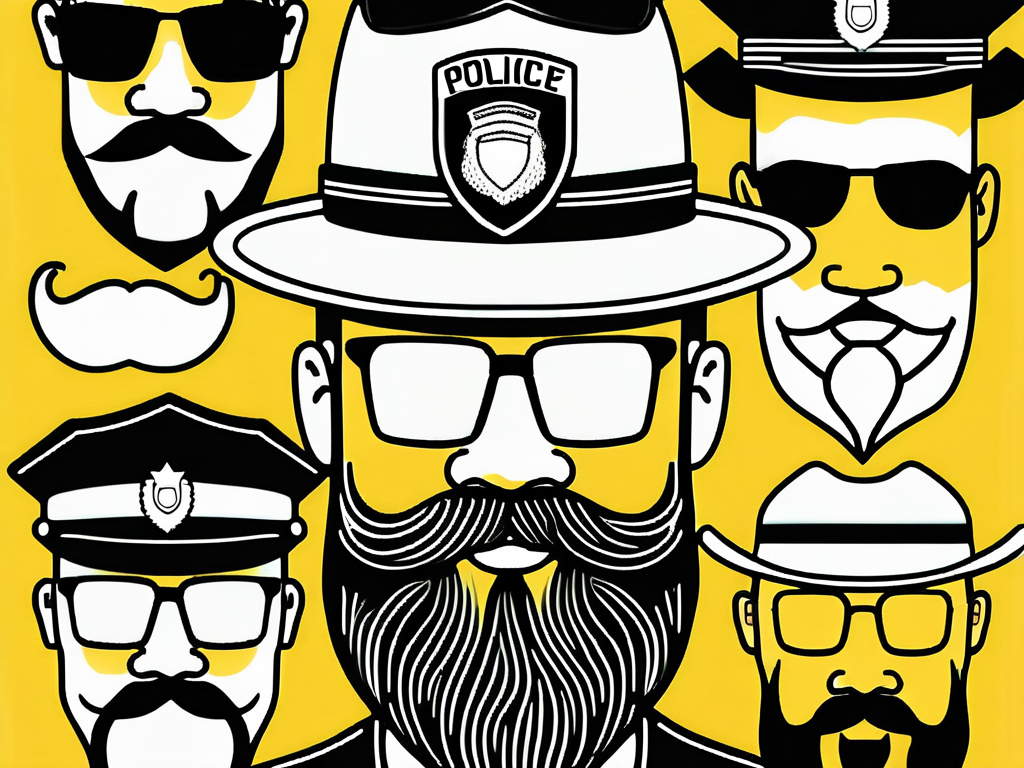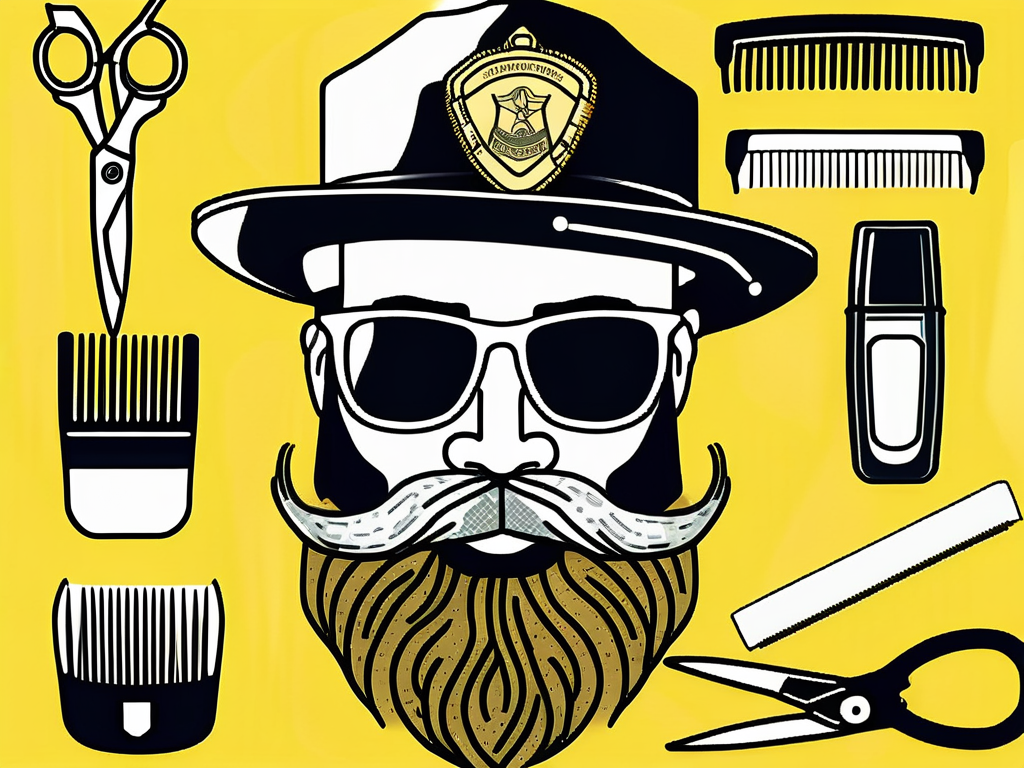Author: Helvis Smoteks
Published at: Jul 31, 2024
Did you know that the rules and regulations regarding beards in the police force are a topic of heated debate? Many people are curious if cops can have beards. While some departments have strict guidelines banning facial hair, others have started to relax their policies.
In this article we will discuss:
No, cops don't have to shave their beards, but policies vary significantly between different law enforcement agencies. Some departments enforce strict grooming standards that prohibit beards to maintain uniformity and ensure proper fitting of safety equipment like gas masks.
However, other departments have relaxed these rules, allowing officers to grow neatly trimmed beards. These changes are often influenced by cultural shifts, individual rights, and the need for inclusivity. Officers interested in growing a beard should check their department's specific regulations to understand the permissible grooming standards.
Factors influencing beard policies include:
Overall, while beards are allowed in some police departments, the specific guidelines and restrictions can vary widely.
Some departments have strict policies that mandate a clean-shaven face for all officers. This approach emphasizes conformity and adheres to traditional ideals of professionalism.
On the other hand, several departments have started to relax their regulations, allowing short and well-groomed beards within certain limits.
It's important to note that the liberalization of beard policies comes with caveats in most cases. For example, officers may be required to:
Moreover, the cultural and historical context of each department often plays a significant role in shaping their stance on facial hair.
For instance, departments located in more conservative regions may uphold stricter grooming standards, while those in progressive urban areas might embrace a more inclusive approach to personal appearance.
Now let's turn our attention to the contentious issue of beards in the police force. Both proponents and opponents of facial hair have strong arguments to support their positions.

Advocates for allowing beards argue that facial hair can enhance community relations. They claim that beards can help officers appear more approachable and relatable, breaking down barriers and building trust with the public.
Furthermore, some believe that allowing officers to have beards promotes individual expression and morale within the force. By allowing a level of personal grooming choice, officers may feel more empowered and positive about their job, which can contribute to better performance and overall job satisfaction.
Moreover, proponents of beards point to the cultural significance of facial hair in different communities. For some officers, growing a beard may be tied to their heritage, traditions, or personal beliefs, adding a layer of diversity and inclusivity to the police force.
On the other side of the argument, opponents of beards in the police force emphasize the importance of professionalism and uniformity. They argue that a clean-shaven appearance is necessary to maintain a uniform and disciplined image.
Additionally, opponents express concerns about the potential for beards to hinder proper fitting of respiratory masks and other protective equipment.
Concerns have also been raised about the potential impact of beards on the perception of authority. Some argue that a strict grooming policy, including a ban on beards, helps establish a sense of authority and command presence, crucial in law enforcement situations that require quick decision-making and respect from the public.
Another significant aspect of the beard debate within law enforcement is the influence of culture and religion. Religious beliefs and cultural norms play a crucial role in shaping policies around facial hair within police departments.

Understanding the intricate relationship between culture, religion, and law enforcement policies is essential for creating a harmonious and inclusive work environment.
Police departments across the globe grapple with the challenge of balancing uniform standards with the diverse cultural and religious backgrounds of their officers.
Religious freedom is a fundamental right, and accommodating officers' religious beliefs is essential in a diverse society.
Many departments have implemented reasonable accommodations to respect the religious practices of their officers, including allowing beards for religious observance.
Recognizing and valuing the religious diversity within police forces not only fosters a sense of inclusivity but also enhances community trust.
By embracing religious accommodation in uniform standards, law enforcement agencies demonstrate a commitment to upholding the constitutional rights of their officers while promoting a culture of respect and understanding.
Cultural differences also come into play when it comes to beard policies. Some communities have cultural traditions or norms that value facial hair, which may conflict with strict clean-shaven policies. These differences in cultural perspectives have prompted some departments to adopt more inclusive regulations.
Embracing cultural diversity within law enforcement agencies enriches the fabric of the organization and strengthens community relations.
By acknowledging and respecting cultural differences in grooming practices, police departments can bridge cultural divides and build stronger connections with the communities they serve.
This nuanced approach to beard policies reflects a commitment to cultural sensitivity and inclusivity within the law enforcement profession.
So, what does the future hold for beard policies in law enforcement? As societal norms evolve, it is likely that we will see further changes in regulations regarding facial hair.
Facial hair has a long history in law enforcement, with some agencies allowing beards for specific reasons such as undercover work or medical conditions.
However, the general trend has been towards stricter grooming standards to maintain a uniform and professional appearance. Despite this, the tide seems to be turning as more departments recognize the importance of inclusivity and diversity in their ranks.
There is growing pressure on departments to review and revise their beard policies. The desire for individual expression, religious accommodation, and positive community relations can propel policy changes in the future.
However, striking a balance between personal freedom and maintaining a professional appearance will remain a challenge for law enforcement agencies.
Some argue that allowing well-groomed beards can actually enhance community policing efforts by making officers more approachable and relatable to the public.
By reflecting the diversity of the communities they serve, officers with beards may help bridge the gap between law enforcement and citizens, fostering trust and cooperation.
Public opinion also plays a significant role in shaping beard policies. As community expectations shift and public support for accommodating facial hair increases, departments may reconsider their regulations accordingly.
It is essential for law enforcement agencies to stay attuned to public sentiment and respond to the changing needs and values of the communities they serve.
Moreover, studies have shown that allowing facial hair can have a positive impact on officer morale and job satisfaction. Feeling respected and valued as individuals can boost overall performance and commitment to the job, ultimately benefiting the department and the community at large.
Maintaining a well-groomed beard is crucial for police officers to balance personal style with a professional appearance. Here are some ways they keep their beards tidy:
As society progresses, beard policies in the police force will evolve to accommodate religious beliefs, enhance community relations, and support officers' well-being.
These changes will reflect the importance of uniform standards and the dynamic social landscape. For premium beard care products to maintain a professional and well-groomed appearance, visit The Beard Struggle.

10 Beard Care Mistakes A Viking Should Never Make
Register now to receive 10 exclusive tips straight to your inbox.
Comments
Hello! Shopping from United States?
Shipping destination